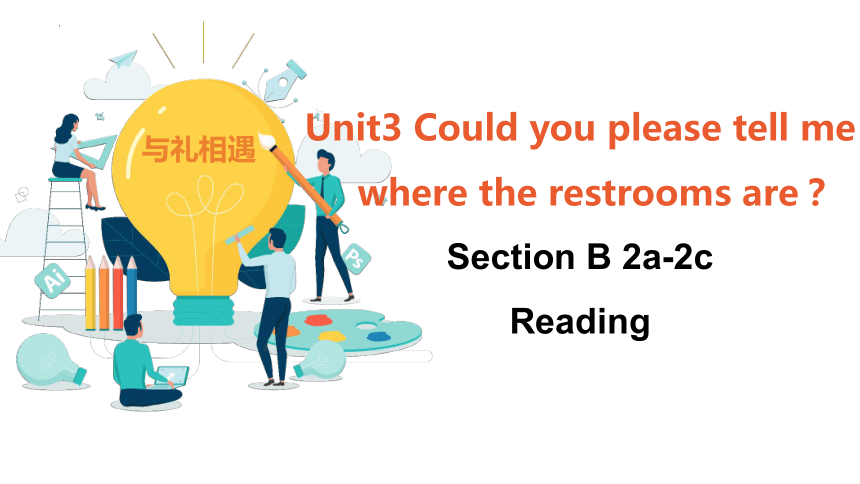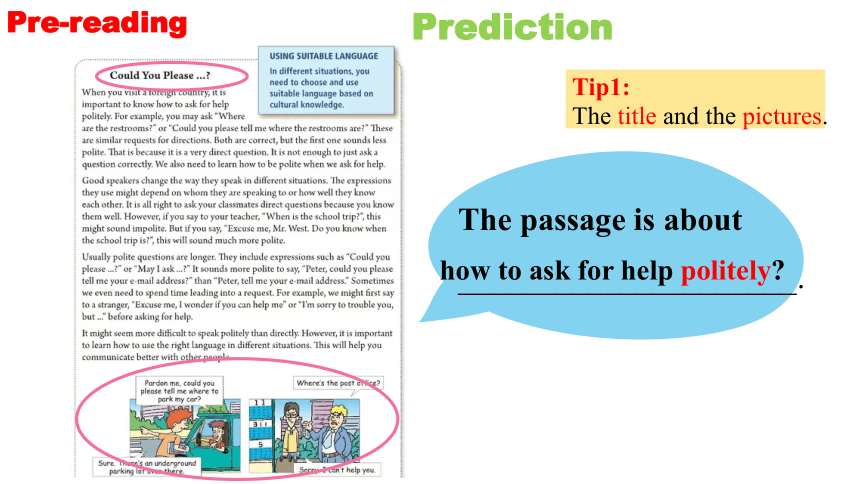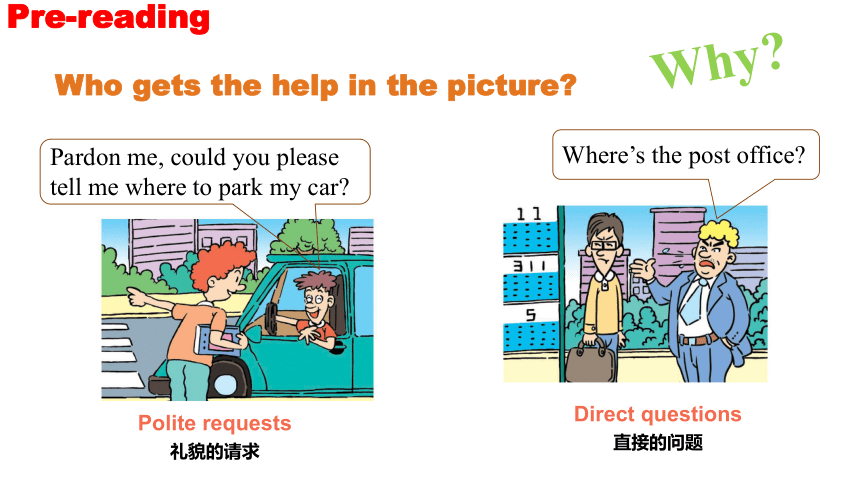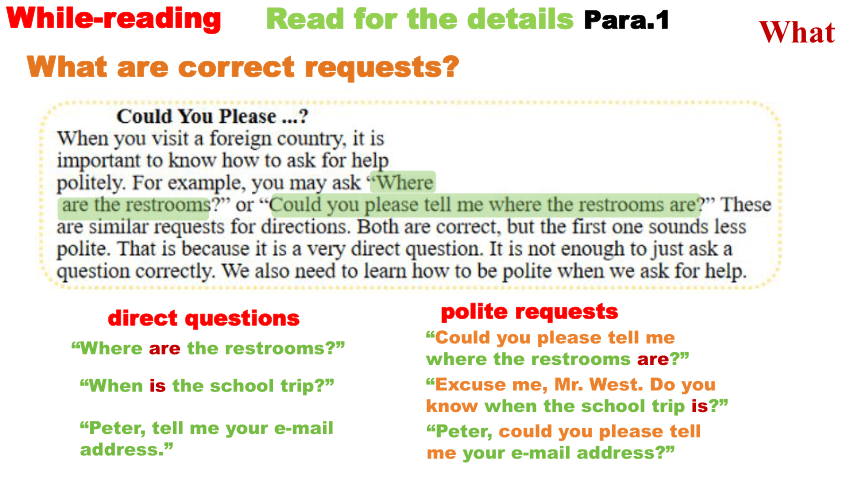Unit3 Could you please tell me where the restrooms are SectionB 2a-2c 课件(共21张PPT) 人教版九年级全册
文档属性
| 名称 | Unit3 Could you please tell me where the restrooms are SectionB 2a-2c 课件(共21张PPT) 人教版九年级全册 |  | |
| 格式 | pptx | ||
| 文件大小 | 14.4MB | ||
| 资源类型 | 教案 | ||
| 版本资源 | 人教新目标(Go for it)版 | ||
| 科目 | 英语 | ||
| 更新时间 | 2024-09-28 09:25:53 | ||
图片预览









文档简介
(共21张PPT)
Unit3 Could you please tell me
where the restrooms are?
Section B 2a-2c
Reading
与礼相遇
Learning objectives
能够意识并在不同的场合跟不同的对象表达
得体的语言。
通过阅读来获取语篇中的细节信息并归纳礼貌表达的方式。
运用阅读技巧归纳语篇的内容要点以及逻辑衔接的方式。
Lead in
Have you visited a foreign country
If you visit a foreign country, what will you worry
You are lost and you ask a stranger for help.
How to ask for help politely
1. Could you please...
2. May I ask...
3. Excuse me, I wonder if you can help me
4. I’m sorry to trouble you, but ...
Pre-reading
Prediction
Pre-reading
The passage is about
_____________________.
how to ask for help politely
Tip1:
The title and the pictures.
Pardon me, could you please tell me where to park my car
Where’s the post office
Who gets the help in the picture
Why
Direct questions
直接的问题
Polite requests
礼貌的请求
Pre-reading
Read for the topic sentences
Tip2:
However and but, can help you find out the topic sentences.
While-reading
Read for the structure
How
What is the structure of the passage
A.
B.
C.
D.
While-reading
Read for the details Para.1
What
What are correct requests
direct questions
polite requests
“Where are the restrooms ”
“When is the school trip ”
“Excuse me, Mr. West. Do you know when the school trip is ”
“Peter, tell me your e-mail address.”
“Peter, could you please tell me your e-mail address ”
“Could you please tell me
where the restrooms are ”
While-reading
Read for the details Para.1
What
Can you guess what the writer will tell us next
过渡句
While-reading
Read for the details Para.2
What
How do good speakers change the way they speak in different situations
depend on
whom they are speaking to
how well they know each other
While-reading
Read for the details Para.2
What
How should they ask different people for information
When is the school trip
Excuse me, Do you know when the school trip is
Direct questions
Polite requests
You can ask your classmates direct questions because you____________________. But polite requests
sound much____________when you talk with your teachers.
know them well
more polite
While-reading
Usually polite questions are longer. They include expressions such as “Could you
please ... ” or “May I ask ... ” It sounds more polite to say, “Peter, could you please
tell me your e-mail address ” than “Peter, tell me your e-mail address.” Sometimes
we even need to spend time leading into a request. For example, we might first say
to a stranger, “Excuse me, I wonder if you can help me” or “I’m sorry to trouble you,
but ...” before asking for help.
Read for the details Para.3
Peter, could you please tell me your e-mail address?
Peter, tell me your e-mail address.
Which one is more polite
What
While-reading
Try to make the requests longer and more polite.
How much are
the T-shirts
Give me a bowl of Heyuan noddles.
Where is the bus stop
While-reading
While-reading
Read for the details Para.4
Why is it important to learn how to use the right language in different situations
_______________________________________________________________
Because it will help us to communicate better with other people.
What
Deeper thinking
Is it suitable to ask all the people around you polite questions
Read for the reasons
Because the writer wants us to
____________ the language
suitably.
Why
choose and use
Deeper thinking
Group work
Post-reading
Choose one of the activities and work in groups.
主题:帮同学打饭
人物角色:(3人)
A:生病的同学
B:帮忙打饭的同学
C:饭堂打饭的叔叔
主题:学习方法
人物角色:(3人)
A:老师
B:同伴
C:你本人
主题:做家务劳动
人物角色:(3人)
A:爸爸
B:妈妈
C:你本人
得体的 语言表达
面部表情(微笑)
肢体语言
Summary
与礼相遇
direct questions
polite requests
Good speakers
depend on
whom they are speaking to
how well they know
each other
longer questions
Could you please...
May I...
Excuse me, I wonder...
use the right language in different situtations.
明礼仪之道 行礼仪之举
提升作业:以思维导图的形式总结礼貌交流的方式。
基础作业:归纳本节课礼貌表达的方式。
巩固作业:写出不同场合下更多礼貌交流的方式。
Homework
Unit3 Could you please tell me
where the restrooms are?
Section B 2a-2c
Reading
与礼相遇
Learning objectives
能够意识并在不同的场合跟不同的对象表达
得体的语言。
通过阅读来获取语篇中的细节信息并归纳礼貌表达的方式。
运用阅读技巧归纳语篇的内容要点以及逻辑衔接的方式。
Lead in
Have you visited a foreign country
If you visit a foreign country, what will you worry
You are lost and you ask a stranger for help.
How to ask for help politely
1. Could you please...
2. May I ask...
3. Excuse me, I wonder if you can help me
4. I’m sorry to trouble you, but ...
Pre-reading
Prediction
Pre-reading
The passage is about
_____________________.
how to ask for help politely
Tip1:
The title and the pictures.
Pardon me, could you please tell me where to park my car
Where’s the post office
Who gets the help in the picture
Why
Direct questions
直接的问题
Polite requests
礼貌的请求
Pre-reading
Read for the topic sentences
Tip2:
However and but, can help you find out the topic sentences.
While-reading
Read for the structure
How
What is the structure of the passage
A.
B.
C.
D.
While-reading
Read for the details Para.1
What
What are correct requests
direct questions
polite requests
“Where are the restrooms ”
“When is the school trip ”
“Excuse me, Mr. West. Do you know when the school trip is ”
“Peter, tell me your e-mail address.”
“Peter, could you please tell me your e-mail address ”
“Could you please tell me
where the restrooms are ”
While-reading
Read for the details Para.1
What
Can you guess what the writer will tell us next
过渡句
While-reading
Read for the details Para.2
What
How do good speakers change the way they speak in different situations
depend on
whom they are speaking to
how well they know each other
While-reading
Read for the details Para.2
What
How should they ask different people for information
When is the school trip
Excuse me, Do you know when the school trip is
Direct questions
Polite requests
You can ask your classmates direct questions because you____________________. But polite requests
sound much____________when you talk with your teachers.
know them well
more polite
While-reading
Usually polite questions are longer. They include expressions such as “Could you
please ... ” or “May I ask ... ” It sounds more polite to say, “Peter, could you please
tell me your e-mail address ” than “Peter, tell me your e-mail address.” Sometimes
we even need to spend time leading into a request. For example, we might first say
to a stranger, “Excuse me, I wonder if you can help me” or “I’m sorry to trouble you,
but ...” before asking for help.
Read for the details Para.3
Peter, could you please tell me your e-mail address?
Peter, tell me your e-mail address.
Which one is more polite
What
While-reading
Try to make the requests longer and more polite.
How much are
the T-shirts
Give me a bowl of Heyuan noddles.
Where is the bus stop
While-reading
While-reading
Read for the details Para.4
Why is it important to learn how to use the right language in different situations
_______________________________________________________________
Because it will help us to communicate better with other people.
What
Deeper thinking
Is it suitable to ask all the people around you polite questions
Read for the reasons
Because the writer wants us to
____________ the language
suitably.
Why
choose and use
Deeper thinking
Group work
Post-reading
Choose one of the activities and work in groups.
主题:帮同学打饭
人物角色:(3人)
A:生病的同学
B:帮忙打饭的同学
C:饭堂打饭的叔叔
主题:学习方法
人物角色:(3人)
A:老师
B:同伴
C:你本人
主题:做家务劳动
人物角色:(3人)
A:爸爸
B:妈妈
C:你本人
得体的 语言表达
面部表情(微笑)
肢体语言
Summary
与礼相遇
direct questions
polite requests
Good speakers
depend on
whom they are speaking to
how well they know
each other
longer questions
Could you please...
May I...
Excuse me, I wonder...
use the right language in different situtations.
明礼仪之道 行礼仪之举
提升作业:以思维导图的形式总结礼貌交流的方式。
基础作业:归纳本节课礼貌表达的方式。
巩固作业:写出不同场合下更多礼貌交流的方式。
Homework
同课章节目录
- Unit 1 How can we become good learners.
- Section A
- Section B
- Unit 2 I think that mooncakes are delicious!
- Section A
- Section B
- Unit 3 Could you please tell me where the restroom
- Section A
- Section B
- Unit 4 I used to be afraid of the dark.
- Section A
- Section B
- Unit 5 What are the shirts made of?
- Section A
- Section B
- Review of Units 1-5
- Unit 6 When was it invented?
- Section A
- Section B
- Unit 7 Teenagers should be allowed to choose their
- Section A
- Section B
- Unit 8 It must belong to Carla.
- Section A
- Section B
- Unit 9 I like music that I can dance to.
- Section A
- Section B
- Unit 10 You're supposed to shake hands.
- Section A
- Section B
- Review of Units 6-10
- Unit 11 Sad movies make me cry.
- Section A
- Section B
- Unit 12 Life is full of the unexpected
- Section A
- Section B
- Unit 13 We're trying to save the earth!
- Section A
- Section B
- Unit 14 I remember meeting all of you in Grade 7.
- Section A
- Section B
- Review of Units 11-14
